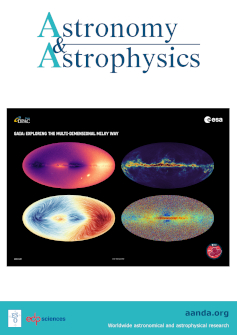Wavelength-dependent far-infrared polarization of HL Tau observed with SOFIA/HAWC+
IF 5.4
2区 物理与天体物理
Q1 ASTRONOMY & ASTROPHYSICS
引用次数: 0
Abstract
We present the first polarimetric observations of a circumstellar disk in the far-infrared wavelength range. We report flux and linear polarization measurements of the young stellar object HL Tau in the bands A (53 μm), C (89 μm), D (155 μm), and E (216 μm) with the High-resolution Airborne Wideband Camera-plus (HAWC+) on board of the Stratospheric Observatory for Infrared Astronomy (SOFIA). The orientation of the polarization vectors is strongly wavelength-dependent and can be attributed to different wavelength-dependent polarization mechanisms in the disk and its local environment. In bands A, C, and D (53 μm to 155 μm), the orientation of the polarization is roughly consistent with a value of 114° at the maximum emission. Hereby, the magnetic field direction is close to that of the spin axis of the disk. In contrast, in band E (216 μm), the orientation is nearly parallel to the minor axis of the projection of the inclined disk. Based on a viscous accretion disk model combined with a surrounding envelope, we performed polarized three-dimensional Monte Carlo radiative transfer simulations. In particular, we considered polarization due to emission and absorption by aligned dust grains, and polarization due to scattering of the thermal reemission (self-scattering). At wavelengths of 53 μm, 89 μm, and 155 μm, we were able to reproduce the observed orientation of the polarization vectors. Here, the origin of polarization is consistent with polarized emission by aligned non-spherical dust grains. In contrast, at a wavelength of 216 μm, the polarization pattern could not be fully matched, however, applying self-scattering and assuming dust grain radii up to 35 μm, we were able to reproduce the flip in the orientation of polarization. We conclude that the polarization is caused by dichroic emission of aligned dust grains in the envelope, while at longer wavelengths, the envelope becomes transparent and the polarization is dominated by self-scattering in the disk.求助全文
约1分钟内获得全文
求助全文
来源期刊

Astronomy & Astrophysics
地学天文-天文与天体物理
CiteScore
10.20
自引率
27.70%
发文量
2105
审稿时长
1-2 weeks
期刊介绍:
Astronomy & Astrophysics is an international Journal that publishes papers on all aspects of astronomy and astrophysics (theoretical, observational, and instrumental) independently of the techniques used to obtain the results.
 求助内容:
求助内容: 应助结果提醒方式:
应助结果提醒方式:


